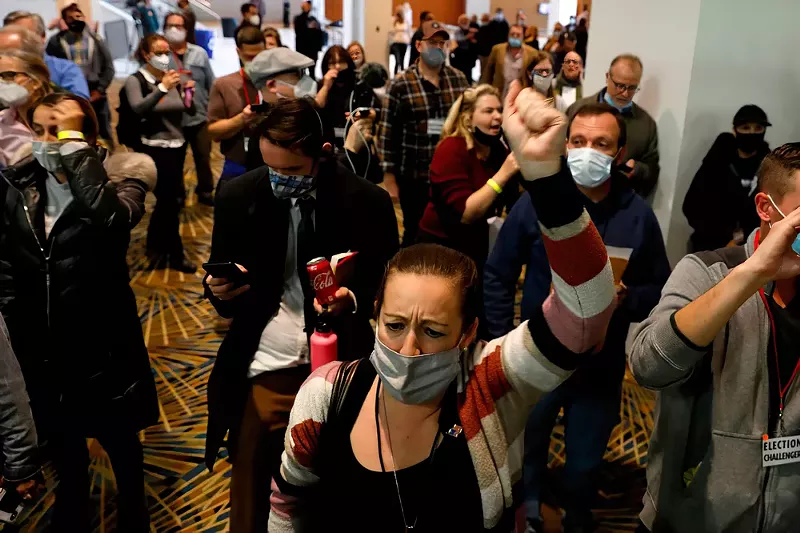
Audio By Carbonatix
[
{
"name": "GPT - Leaderboard - Inline - Content",
"component": "35519556",
"insertPoint": "5th",
"startingPoint": "3",
"requiredCountToDisplay": "3",
"maxInsertions": 100,
"adList": [
{
"adPreset": "LeaderboardInline"
}
]
}
]

Devi Bones / Shutterstock.com
Supporters of President Donald Trump interrupted the ballot-counting process at Detroit's TCF Center on Nov. 4.
For a few hours on Tuesday evening, it looked like Michigan could be heading toward no less than a constitutional crisis.
The Wayne County Board of Canvassers, in what was supposed to be a routine vote to certify the results of the 2020 election, failed to do so — locked in a partisan deadlock. At issue were discrepancies in the tally of votes due to typical election irregularities, likely the result of human or machine error. The glitches came out to one or two votes per precinct, or around 450 total votes — certainly not enough to overturn Joe Biden's nearly 150,000-vote margin of victory over President Donald Trump in Michigan.
The meeting's public comment section exploded with rage, as did social media.
"The board's decision would stand for only about three hours," The Washington Post reported. "But — in those three hours on Tuesday — American politics centered on those four people and that small room."
As The New York Times reported, a deadlocked vote to certify election results was not normal.
"It would be the end of democracy as we know it," University of Kentucky law professor Joshua Douglas told the Associated Press. "This is just not a thing that can happen."
Faced with pressure, and told they could ask for the Secretary of State to conduct an audit if they were really so concerned about fixing discrepancies, the Republican board members — Monica Palmer and William Hartmann — eventually changed their minds and agreed to certify the votes.
But now, it looks like a constitutional crisis could still be on the table.
On Wednesday evening, Palmer and Hartmann filed affidavits attempting to rescind their "yes" votes. Palmer told the Post that she changed her mind because she felt pressured to certify the results. At one point during the meeting, Palmer suggested certifying all the Wayne County votes except for Detroit's, leading to accusations of racism that Palmer, of Detroit's affluent neighboring community of Grosse Pointe, said left her shaken. She also said she reneged because she later found out a Wayne County audit was not legally binding.
Of course, there's likely another factor at play. According to the AP, a person familiar with the matter said Trump reached out to Palmer and Hartmann on Tuesday evening.
"It is clear that Palmer and Hartmann are simply kowtowing to the GOP party leadership," Michigan Democratic Party chair Lavora Barnes said in a statement. "There is no legal basis to their claims nor does there exist a path for them to 'take back' their vote." The Michigan Democratic Party is calling on Palmer to resign.
It could be too late to make a difference. Jonathan Kinloch, a Democrat and the Wayne County Board of Canvassers' vice chairman, told the Post that the deadline to certify was Wednesday. The results now head to the state board of canvassers for certification.
However, according to the Post, at least one of the Republican state board of canvassers has "has already expressed skepticism about voting results in Detroit." The state board meets Monday, where a similar deadlock could play out.
The Trump team's communication with the Republicans on the board suggest a level of coordination and influence over the process, as does the Trump team's other election lawsuits across the country. Jenna Ellis, one of Trump's lawyers, appeared to spill the beans about their plan to overturn Michigan's vote on Twitter. "If the state board follows suit, the Republican state legislator will select the electors," she wrote.
It is only after the state board certifies the election results that Michigan can send its 16 electors to the Electoral College to finalize the presidential vote.
In theory, the constitution allows for state legislatures to name their own electors for the Electoral College. For their part, Michigan's Congressional Republicans have said they would not subvert the will of the voters by selecting their own electors. And even if they did, legal experts say Gov. Gretchen Whitmer, a Democrat, could appoint her own. If the federal government was forced to intervene, they would likely go with the Governor's.
Congress could also theoretically toss out Michigan's electoral votes altogether, but then "the country would be in constitutional crisis territory," The New York Times reported.
Again, it likely wouldn't ultimately change the results of the 2020 election, because Trump's lawyers would have to somehow overturn the vote in multiple states to get the necessary number of Electoral College votes.
However, this attempt in Wayne County shows just how fragile this whole system is, and how it relies on norms, and bipartisan agreement to work together in good faith — not exactly a hallmark of Trump's America.
Stay on top of Detroit news and views. Sign up for our weekly issue newsletter delivered each Wednesday.






